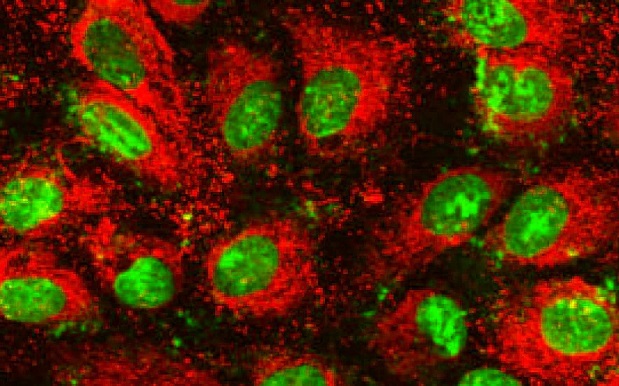Nikhil Prasad Fact checked by:Thailand Medical News Team Oct 09, 2025 4 months, 2 weeks, 2 days, 1 hour, 20 minutes ago
Medical News:
Lingering Endothelial Damage Observed Months After Infection
A new study led by researchers from the Institut d'Investigació Biomèdica de Girona (IDIBGI-CERCA), University of Girona, Institut d'Investigacions Biomèdiques August Pi i Sunyer (IDIBAPS), and the University of Barcelona reveals that COVID-19 causes prolonged damage to the body’s vascular repair system, even months after recovery. The research analyzed endothelial colony-forming cells (ECFCs) — special progenitor cells that help maintain and regenerate blood vessels — from patients who had recovered from SARS-CoV-2 infection at both 3- and 6-months post-infection.
 COVID-19 Leaves Lasting Damage to Blood Vessel Repair Cells
COVID-19 Leaves Lasting Damage to Blood Vessel Repair Cells
Using advanced RNA sequencing, the scientists compared the gene expression of these cells to those from healthy individuals. This
Medical News report shows that even half a year after recovery, these ECFCs continued to display disrupted activity in key genes that control inflammation, oxidative stress, and blood vessel repair, pointing to persistent endothelial dysfunction.
Persistent Inflammation and Impaired Vascular Function
The study found that post-COVID ECFCs had decreased activity in several important genes such as NOS3, KLF2, ANGPT1, TGFB1, and SMAD6 — all crucial for maintaining vascular balance and preventing clot formation. Meanwhile, inflammatory genes like CASP1, CXCL5, IL12A, SOD2, and TLR2 were significantly elevated. This imbalance suggests that blood vessel cells remain in an activated, inflamed state long after the initial viral infection has passed.
Interestingly, these changes were nearly identical between 3-month and 6-month follow-ups, meaning that the damage did not normalize over time. Patients who had previously suffered from pulmonary embolism (PE) during acute COVID-19 showed further downregulation of thrombosis-related genes such as PTGS2 and ACKR3, indicating a higher long-term risk of clotting complications.
Why Endothelial Health Matters After COVID-19
The endothelium lines every blood vessel in the body and plays a key role in regulating circulation, oxygen delivery, and immune responses. When it is damaged, it can trigger inflammation, blood clots, and tissue injury in multiple organs — all hallmark symptoms of long COVID. The persistent changes in ECFCs described in the study mirror clinical observations of patients who continue to experience fatigue, breathlessness, and heart-related issues months after recovery.
The researchers emphasize that this endothelial dysfunction could be the hidden link behind many long-term complications seen in post-COVID syndrome. They suggest that therapies aimed at restoring endothelial health — such as targeting nitric oxide pathways or modulating inflammation — may help improve recovery outcomes.
No Major Genetic Difference Between Long COVID and Non-Long COVID Patients
;
Interestingly, when the team compared patients who had long COVID symptoms to those who did not, they found no major gene expression differences in their ECFCs. This implies that while vascular injury is common after COVID-19, it might not fully explain why some people develop lingering symptoms. The scientists propose that mitochondrial dysfunction and systemic inflammation could also be driving factors that need further exploration.
Call for Continued Monitoring and Research
According to the authors, persistent vascular injury up to six months after infection underscores the need for long-term cardiovascular monitoring of recovered COVID-19 patients. The study also highlights potential molecular targets for new therapies to protect blood vessels and reduce future complications.
The study findings were published in the peer reviewed journal: iScience.
https://www.sciencedirect.com/science/article/pii/S2589004225019923
For the latest COVID-19 News, keep on logging to Thailand
Medical News.
Read Also:
https://www.thailandmedical.news/news/breaking-sars-cov-2-encodes-circular-rnas-that-can-impair-endothelial-cells-and-cause-cardiovascular-issues
https://www.thailandmedical.news/news/researchers-in-belgium-find-that-most-with-long-covid-exhibit-hypercoagulability-and-endothelial-dysfunction
https://www.thailandmedical.news/news/covid-19-induces-expression-of-anti-agtr1-autoantibodies-causing-endothelial-dysfunction-and-symptoms-treatable-by-losartan
